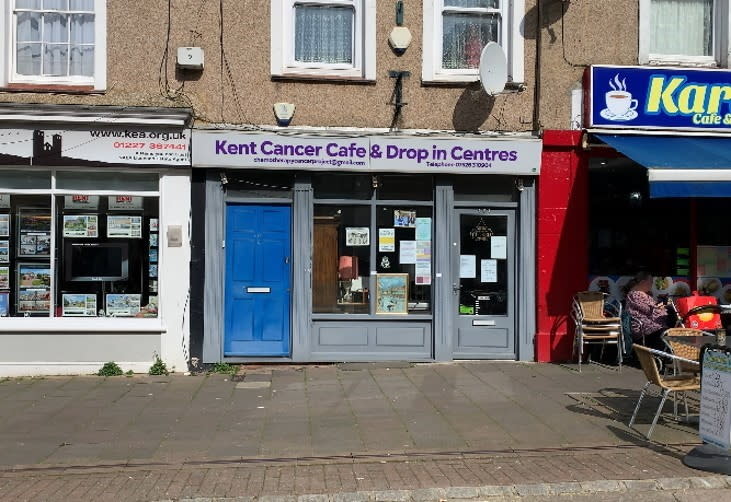Cancer charity shop forced to close after heartless shoplifters steal items

An independent charity shop has been forced to close its doors for good after a rise in shoplifting and the impact of the cost of living crisis.
Graeme Sergeant, head of the Chemotherapy Cancer Project in Herne Bay, Kent, said thefts, domination by larger charities and waning donations prompted the difficult decision for him to shut up shop.
His 70-year-old wife Lizzie Sergeant – herself a volunteer at the shop – also needs more of his attention after she was diagnosed with stage four cancer.
Sergeant believes there's an oversaturation of not-for-profits in the seaside town, leading to the downfall of many smaller charities like his, which began by making gift bags for people going through chemotherapy treatment.
“There's a cost-of-living crisis," he said. "Unfortunately, the level of donations we've been getting is not enough.
“We did a collection last Saturday and only got £34. Right now, it costs us more to open the shop than to have it shut. People aren’t coming in and we still pay for the gas, electricity and things like that.
“For every 10 donations going in, I'd say the bigger independent charities such as Maya’s Community Support Centre and Free Shop are getting eight or nine of them, and we're getting maybe one. It’s had a massive effect on the smaller charities in the town.”
'You wouldn't believe what people nick'
Sergeant says shoplifting has also been a big issue for his staff, along with pretty much every business in Herne Bay.
“You wouldn’t believe what people nick. You wouldn't think they'd rob charity shops, but they do," he said. "I mean, who nicks a stopper out of a decanter? Who fills a van with four or five pieces of clothes when they're buying one - or not buying anything?
"We can't afford sophisticated security. We're all volunteers - no one takes a wage and it adds up. We had someone say, 'Well you don't pay for nothing' - but we do.
"We pay the same bills as any normal business, and it all adds up. If you're not getting the income in, or someone's walking off with some of that income, you can't pay your bills."
Click below to see the latest South and South East headlines
Figures released in February showed shoplifting had hit a record high nationwide, with 16.7 million incidents recorded in 2003, more than double compared with the previous year, with many pointing to rampant inflation as a factor.
When the Chemotherapy Cancer Project ceases trading in August, Sergeant says "I leave it with a heavy heart".
"When I finally close the door I must admit I'll probably shed a few tears because I get quite emotional now even just thinking about it." he said.
However, he was buoyed by the fact that the Salvation Army will take over the running of the charity's drop-in sessions for those undergoing chemotherapy.

Why are so many high street shops closing?
Chemotherapy Cancer Project is the latest of a long-line of high street outlets to close partly due to inflationary pressures.
In May last year, charity shop Young Lives vs Cancer announced it would close all 13 of its shops, which made a net loss of £1.4million in 2021/22.
While this was partly to do with the COVID-19 pandemic and one-off repair costs, the charity still decided it had become too expensive to run the shops as viable businesses.
"In the instance of retail, it was clear that other income generation channels could in the future generate more, at less of a cost," said the charity's director of income and engagement Luke Mallett.
These inflationary pressures are putting high street stores of all kinds at risk, with the British Retail Consortium warning in July that 6,000 retail outlets had closed in the past five years.
The trade association's chief executive Helen Dickinson said "crippling business rates" and the impact of COVID-19 lockdowns were a "key part of decisions to close stores and think twice about new openings".
Lucy Stainton, commercial director of the BRC's Local Data Company, added: “The high street has seen some of the most notable impacts, with rising rents and increased competition putting pressure on small and independent businesses, who may struggle to meet high operating costs."
When asked by Yahoo News what high street shops need to get out of this bind, Tom Ironside, director of Business and Regulation at the BRC called for a serious overhaul in regulations.
“Retailers need a more coordinated approach to tax, policy and regulation which recognises the cumulative cost burden they operate under and the impact this has on investment in the customer offer and communities," he said. "Reforms to business and local tax, an increased focus on crime prevention and an improved planning policy are all key to the revival of high streets across the country."
Read more
Which UK high street shops have closed down? Full list of shops (Evening Standard)
The empty units on Sutton High Street – from former Wilko’s stores to derelict banks(Sutton and Croydon Guardian)
When will the cost of living crisis end? (Yahoo News)



